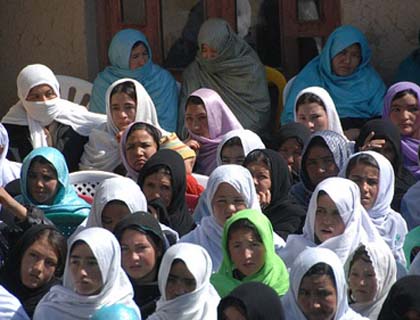This is twenty first century and women in countries categorized as 'first word' enjoy full rights and freedom. They have earned this status by fighting hard for their rights for centuries. In third world countries, however, women are still deprived of their basic rights. Afghanistan falls in the list of the countries where women are not only denied their rights but also are subjected to extreme forms of violence.
Article one of UN General Assembly resolution, 20 December, 1993 declares the term violence against women as, "Any act of gender-based violence that results in, or is likely to result in, physical, sexual or psychological harm or suffering to women, including threats of such acts, coercion or arbitrary deprivation of liberty, whether occurring in public or in private life."
As we are nearing the International day for the elimination of violence against women – 25 November – it is very vital to write about the women of Afghanistan. The more media covers stories of violence against women in here, the more the efforts to eliminate violence against women will be supported.
By resolution 54/134 of 17 December 1999, the United Nations General Assembly designated 25 November as the International Day for the Elimination of Violence against Women, and invited governments, international organizations and NGOs to organize activities designed to raise public awareness of the problem on that day.
Women's activists have marked 25 November as a day against violence since 1981. This date came from the brutal assassination in 1960, of the three Mirabal sisters, political activists in the Dominican Republic, on orders of Dominican ruler Rafael Trujillo (1930-1961).
The international day for elimination of violence against, like all the previous years, will be marked in Afghanistan by various national and international organizations working for human and women rights. Once again workshops, seminars and other gatherings will be held in province and capital of Afghanistan for condemning increasing violence against women.
Although such programs are deemed important to draw attention of government and public towards the sufferings of women, experts maintain such gatherings are no cure for the massive troubles faced by Afghan women.
Our country's poor rating in security, opium, corruption, poverty, women and children rights and so many others is doing much to defame our national image at world level. Afghanistan has been called the most dangerous place for women.
Afghanistan was voted the most dangerous country for women in a poll of experts by the Thomson Reuters Foundation this year. Antonella Notari, head of Women Change Makers, a group that supports women social entrepreneurs globally, said a combination of ongoing conflict, NATO airstrikes and cultural practices made Afghanistan a "very dangerous place" for women to live in. Afghanistan is followed by Congo, Pakistan and India at 2nd, 3rd and 4th positions.
Afghanistan has man-dominated society. Men have the upper hand and almost decide on the all affairs of life. The trend to suppress the rights and voice of women got its worst shape during the government of Taliban.
Rights groups and Western governments described the situation as one of the worst that the world had encountered for women at that time. Education, the right to vote and almost all work were banned for women by the Taliban government as un-Islamic from 1996-2001.
A Sharia law also imposed harsh punishment for adultery, which almost always favored men. The Taliban also enforced a strict dress code involving a head-to-toe burqa when women left their homes. Restrictions on their movement were also enforced. Women were not allowed by law to walk around unless accompanied by a male relative or their husband. Even then, they were told to keep their movement outside the home to a minimum.
Since 2001, many things have changed for women. There is a quota for women in Afghan parliament that has reserved a quarter of its 249 seats for them. Today millions of girls go to schools and women participation in many fields including politics, media and business has increased, albeit this participation has faced grave hurdles and many women have lost their lives because of having roles in such areas. At the same time, for a big portion of women population, life hasn't changed and still Taliban-like rules apply on them.
According to the figures of Afghanistan Independent Human Rights Commission (AIHRC), violence against women has increased in the solar year 1390. In first half of 1390, the AIHRC registered 2,433 cases of violence against women.
Although many cases go unreported, the figure is concerning as it signals significant increase in the violation of women rights. At the same time, a nine-year report by AIHRC released on Sunday says nearly 40,000 cases of violence of various forms against women have been registered.
AIHRC chief, Sima Samar, told a news conference that violence against women in remote areas of the country had become a common occurrence. "We will never succeed in combating the scourge as long as specific reasons for the violence are not identified."
For women life cannot change until they have not the same rights as men in making decisions at family to national levels. Such a condition will never triumph in Afghanistan, unless democracy is strong and law and justice govern it. The international day for elimination of violence against is a day to hear the voices of thousands of Afghan women who suffer brutality, abuses, punishment and various other forms of violence just because of being a mother, a sister, a daughter and a wife.

